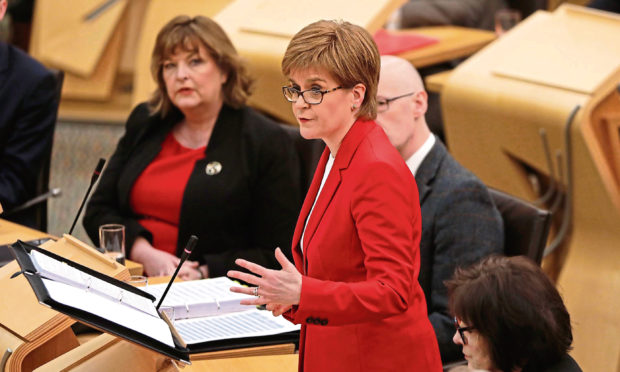Nicola Sturgeon has a tough year ahead.
May and Corbyn may not survive the year, or the season, but Sturgeon will still be in office come 2020.
However, she may look damaged beyond repair in 12 months’ time.
Theresa May once looked the dogged public servant, but now appears spaced out on stubbornness.
Meanwhile, Jeremy Corbyn is engaged in an act of self-immolation.
Not for any great cause you understand, but just because he couldn’t be trusted with the political matches.
In comparison Sturgeon looks serious, competent and sympathetic.
This is in keeping with a performance which has made her the best first minister.
No one can take the Founding Father title from Donald Dewar, but we forget his time as FM was marked by endless Labour spats and no policy fireworks.
Henry McLeish followed, and while he could play at confident leadership in public, he was dithering in private, and thus lost support.
Jack McConnell came in as the party apparatchik yet hinted at radical change in office – his bid for a reformed education curriculum was sincere, and took on vested interests – but will be remembered for “doing less”.
Salmond followed and Alex gave the office swagger and a higher level of political wisdom.
As time goes by, it’s hard to see his great achievements beyond winning the mandate for referendum.
In contrast, Nicola Sturgeon is able in parliament, a confident leader, and has a grip on policy and process.
She commands an obedient party, and a lot of respect across the UK as a serious person.
It is true that her budget decisions have cut at local government and education, but she has diverted money to generational change in the form of early years.
We may not know for a decade or so if this strategy has worked, but in committing to it she has done something more radical and compassionate for Scotland than any FM before her.
Yet she has made two huge mistakes in office.
The first was to think the EU referendum result would fundamentally change Scotland, the second to set a timetable on another independence referendum.
In some ways it’s astonishing she is still in office – bad calls like hers usually ignite rebellion.
She survives because the SNP is still loath to break ranks in public, while the opposition in Richard Leonard’s Labour is so ineffective it might as well not exist.
She cannot, however, afford another mistake.
Pressure within the SNP is building for an Indyref date.
The days of fundamentalists versus gradualists are returning – this divide split the party in the 1990s over devolution.
The Fundies want action quickly and mutter about needing a new leader if she won’t deliver.
I doubt this will amount to a real challenge, but further erodes the loyalty which has preserved the image of a competent party.
Her problem is that for all the words and opposition, she has had no bearing on Brexit – no political trophies to hang on the wall.
In the absence of any influence on Brexit, she is left with Indy as her default option.
Sturgeon will keep pushing the date away for the simple reason that the polls haven’t shifted in Indy’s favour.
Which cuts to the heart of her difficult year, and possibly the reason she will ultimately be judged a failure by her party.
The SNP is still a policy averse party, and one which prefers stunts to content.
An example is how the Westminster group of MPs appear much happier with Ian Blackford’s buffoonery than they did under Angus Robertson’s measured leadership.
This is still a movement that would rather flick two fingers at the UK than seriously plan Scotland’s future.
Which is why the polls haven’t moved.
The section of the electorate who see Brexit as an economic matter also see Indy as a question of money.
Brexit has warned them not to rely on bold assertion about things being better.
They need some solid research which sets out the financial risks and rewards of big change.
The only work existing says things will be worse.
Andrew Wilson’s Growth Commission has destroyed the old Indy argument (he rightly says Scotland’s economy will shrink on independence), but replaced it with nothing.
There is literally nothing on record which supports the idea that the working class will be protected, or public services better, under Indy – a core part of Sturgeon’s political mission.
When Patrick Harvie of the Greens calls for a quick Indy referendum, he does so with no supporting policy material whatsoever.
Sturgeon commissioned Wilson et al and she was right to do so – the argument badly needed some honesty.
But in so doing she has, paradoxically, left her own vision of Scotland as a fairer society in tatters.
Britain may look more feeble than ever before, her political system a thing of mockery and leadership a thing of the past.
But none of that has changed the political arithmetic of Scotland.
Thus we are likely to see Brexit go ahead, but no Indy referendum and no sign of a stronger Indy case.
She might still be in office, but in power?


